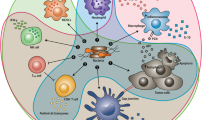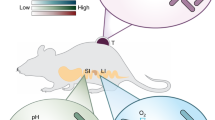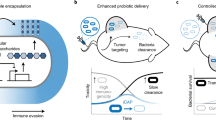Abstract
A fundamental obstacle in gene therapy for cancer is the specific delivery of an anticancer gene product to a solid tumor, and yet no systemic delivery system that specifically targets solid tumors currently exists. A strain of domestic bacteria, Bifidobacterium longum, which is nonpathogenic and anaerobic, selectively localized and proliferated in several types of mouse solid tumors after systemic application. In this report, we further describe a novel approach to cancer gene therapy in which genetically engineered Bifidobacterium is used as a tumor-specific vector. Similarly to wild-type B. longum, genetically engineered B. longum could be detected in tumor tissue only and was not found in a large survey of normal mouse tissues after intravenous injection. This finding strongly suggests that obligate anaerobic bacteria such as Bifidobacterium can be used as highly specific gene delivery vectors for cancer gene therapy.
This is a preview of subscription content, access via your institution
Access options
Subscribe to this journal
Receive 12 print issues and online access
$259.00 per year
only $21.58 per issue
Buy this article
- Purchase on Springer Link
- Instant access to full article PDF
Prices may be subject to local taxes which are calculated during checkout
Similar content being viewed by others
Author information
Authors and Affiliations
Corresponding author
Rights and permissions
About this article
Cite this article
Yazawa, K., Fujimori, M., Amano, J. et al. Bifidobacterium longum as a delivery system for cancer gene therapy: Selective localization and growth in hypoxic tumors. Cancer Gene Ther 7, 269–274 (2000). https://doi.org/10.1038/sj.cgt.7700122
Received:
Accepted:
Published:
Issue Date:
DOI: https://doi.org/10.1038/sj.cgt.7700122
Keywords
This article is cited by
-
Engineered live bacteria as disease detection and diagnosis tools
Journal of Biological Engineering (2023)
-
Regulation of tissue-resident memory T cells by the Microbiota
Mucosal Immunology (2022)
-
Bacterial bioluminescence assay for bioanalysis and bioimaging
Analytical and Bioanalytical Chemistry (2022)
-
Feasibility between Bifidobacteria Targeting and Changes in the Acoustic Environment of tumor Tissue for Synergistic HIFU
Scientific Reports (2020)
-
Potential usefulness of Brevibacillus for bacterial cancer therapy: intratumoral provision of tumor necrosis factor-α and anticancer effects
Cancer Gene Therapy (2018)



